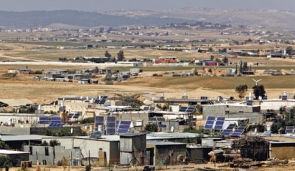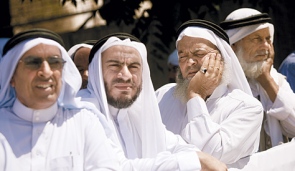Israel approves plan to relocate 30,000 Bedouin from unrecognized villages
 Sunday, September 11, 2011 at 10:54PM
Sunday, September 11, 2011 at 10:54PM By Zafrir Rinat
Haaretz 11 September 2011
Prime Minister Benjamin Netanyahu's cabinet on Sunday approved a plan to relocate tens of thousands of Bedouin from their unrecognized villages into settlements with official state status.
The plan emerges from the Prawer Report, drafted to find a solution to the problem of unrecognized villages in the Negev.
 Solar panels springing up on the roofs of Bedouin houses in the Negev.Photo by: Eliyahu Hershkowitz
Solar panels springing up on the roofs of Bedouin houses in the Negev.Photo by: Eliyahu Hershkowitz
As part of the plan, some 20,000 to 30,000 Bedouon will be relocated to recognized settlements including Rahat, Khura and Ksayfe. The plan also includes financial compensation for those relocated, as well as alternate plots of land. The program is estimated to cost the state NIS 6.8 billion.
Opponents of the plan have accusing the government of evacuating people from their homes for no justified reason and against their will.
Bedouin representative called the decision "a declaration of war," and some 150 members of the community gathered outside the prime minister's office in Jerusalem on Sunday to protest the decision.
"This stupid government will be responsible for a Bedouin Intifada in the Negev," said Arab MK Taleb al-Sana, who took part in the protest.
Adalah, the Legal Center for Arab Minority Rights in Israel, slammed the government's approval of the plan as a major violation of basic rights, pointing out that it would result in the uprooting of tens of thousands of people and the demolition of many Bedouin villages.
The Association for Civil Rights in Israel in June submitted its objections to the Prawer Report and argued that the conditions it sets for recognizing Bedouin villages are prejudicial.
These include meeting minimal levels of population density, contiguity and economic sustainability. The criteria established, the organization maintains, flout principles of equality and justice in the distribution of resources. "If the same criteria were applied to the Jewish population, whole settlements - including community settlements, observatories, kibbutzim and moshavim - would be doomed," the association notes.
Moreover, according to its claims, Bedouin villages are planned without considering the needs of the population, which is largely agrarian and rural, not urban. The association also opposes making any planning for the Bedouin conditional on settling disputes over land ownership.
----------------------------------------------------------------------------------------------------------------------------------
Cabinet approves plan to relocate Negev Bedouin
http://www.haaretz.com/print-edition/news/cabinet-approves-plan-to-relocate-negev-bedouin-1.383842
Rights groups say decision to move 30,000 to recognized towns does not conform to international obligations.
Monday 12 September 2011
On Sunday the cabinet approved a plan to relocate tens of thousands of Bedouin from unrecognized villages into communities with official status.
As part of the plan, which includes financial compensation for people who can prove they have worked the land they lay claim to or offers of alternative land, some 20,000 to 30,000 Bedouin from 13 unrecognized communities will have to move to existing recognized towns.

Bedouin protestingagainst the reloction plan outside the Prime Minister's Office in Jerusalem on Sunday.Photo by Emil Salman
As the cabinet was meeting, some 150 Bedouin from unrecognized villages in the Negev staged a protest outside the Prime Minister's Office.
The plan emerges from the recommendations of a Prime Minister's Office team led by Ehud Prawer, drafted to find a solution to the problem of unrecognized villages in the Negev.
On Sunday protesters slammed the Prawer report, saying that no Bedouin were consulted during its preparation, as planning and civil rights groups issued their own plan.
The cabinet decision calls for communities and employment centers for the Bedouin to be established along three main routes: the Rahat-Be'er Sheva road; the Shoket Junction-Tel Arad road, and the Be'er Sheva-Dimona road. The communities' boundaries will be determined by existing farming areas plus land to be allocated by the government.
MK Talab al-Sana (United Arab List-Ta'al ) came out to support the protesters, calling the plan a "nakba [disaster] for the whole Bedouin population," invoking the Arabic word used to describe the 1948 War of Independence.
Prime Minister Benjamin Netanyahu said after the cabinet vote that the plan was "for the state and the residents of the Negev."
Adalah, the Legal Center for Arab Minority Rights in Israel called the plan "a declaration of war on the Bedouin in the Negev."
According to the plan, a law will be drafted whereby Bedouin who can prove they owned land until 1979 will receive alternative land in exchange for land they transfer to the state. Others will receive monetary compensation.
A total of some 70,000 Bedouin currently live in unrecognized villages in the Negev. Today's cabinet decision calls for recognition of some of the unrecognized communities in areas where the regional master plan for the greater Be'er Sheva area has already been earmarked as land for communities. The director general of the Prime Minister's Office, Eyal Gabai, said a variety of communities would be planned, including farming communities.
"We estimate that about 30,000 people will not remain where they are now living, but will vacate lands on which they have squatted. But they will be able to find an alternative place to live in the same area," Gabai said.
A senior official in the Prime Minister's Office said: "This process has been presented in the media as uprooting, but in fact it is the broadest possible move to allow the population to remain in place."
The Regional Council of Unrecognized Villages, the planning association Bimkom and the Bedouin women's group Sidra presented their own plan on Sunday, proposing "rational" legalization of all 46 unrecognized villages. The alternative plan does not propose legalizing all illegal construction, as some Bedouin demand, but suggests that the unrecognized communities adhere to accepted planning principles in terms of greater density, allocation of land for public buildings and conservation of open space.
The framers of the alternative plan say that planning must take into consideration the tribal and family structure behind Bedouin land use patterns, and that the Prawer report does not take the Bedouin lifestyle into consideration.
"Our plan is more applicable, because it was created from within the Bedouin community but conforms to accepted planning principles in Israel today," Salem al-Wakil, spokesman for the Regional Council of Unrecognized Villages, said, adding that their plan takes into consideration that in some cases communities will have to be moved.
Representatives of groups opposed to the plan said it also went against the recommendations of the 2008 Goldberg Commission report, which found that a grave injustice had been done to the Bedouin, which should be corrected by legalizing as many of the unrecognized communities as possible.
The Negev Coexistence Forum for Civil Equality said the cabinet decision was surprising in light of a recent U.N. report on the rights of indigenous peoples, whose author, Prof. James Anaya, criticized Israel's attitude toward its Bedouin citizens and called on the government to stop house demolitions in the Negev.
Amnesty International also slammed Sunday's cabinet decision, calling it a serious blow to Bedouin rights to proper housing and saying it did not conform to Israel's international human rights obligations. Amnesty International also said that international standards required the government to consult the Bedouin population on such a plan.
----------------------------------------------------------------------------------------------------------------
 APJP |
APJP |  Post a Comment |
Post a Comment |